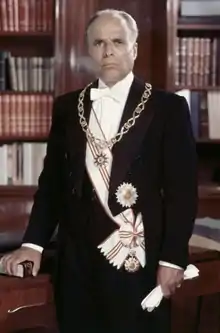Bourguibism
Bourguibism (Arabic: البورقيبية al-Būrqībiyah, French: bourguibisme) refers to the policies of Habib Bourguiba, first president of Tunisia, and his followers.
| ||
|---|---|---|
|
Political career
|
||
Bourguibism is defined by a strong commitment to national independence and a specifically Tunisian nationalism (as opposed to pan-Maghrebi or pan-Arabic ideas, given that Tunisia would only have played a minor role in a potential pan-Arabic project that would likely have been dominated by Egypt),[1][2] a state capitalist approach on economic development,[3][4] welfare state,[5] a statist and corporatist interpretation of populism,[6] strict secularism,[7] and cultural modernity, advocating Tunisia's place as a bridge between Arab-Islamic and Western civilisation.[8] Bourguibism is responsible for Tunisia's comparatively high divorce rates, which is one of the highest in the Arab and Islamic World and relatively late age for women to get married (the average age for a women is 35 years, which is much higher compared to most other Arab countries). The women of Tunisia are more sexually liberated unlike their neighboring countries as well as the women have a relatively strong role in economy, society and labour (all of which are comparable to the West).[9][10] While Bourguibists condemned Tunisians who had collaborated with the French colonial rulers,[11] they did not repress the strong European cultural influence on Tunisia and French continued to be the language of higher education and elite culture.[12] Bourguibism is sometimes described as a variety of Kemalism but with focus on the Tunisian identity.[13]
As a political style or strategy, Bourguibism is characterised by intransigence in pursuing certain goals and non-negotiable principles combined with flexibility in negotiations and readiness to compromise considering the means to effectuate them.[14] It is therefore described as pragmatic, non-ideological, moderate, and reformist rather than revolutionary, but determined and relentless at the same time.[15][16] For example, despite being decidedly secularist, Bourguiba made sure to curtail the public role of Islam only carefully and gradually, in order not to arouse opposition from conservative Muslims.[12]
Political parties with Bourguibist platforms
- Neo Destour/Socialist Destourian Party/Democratic Constitutional Rally (1934–2011)
- National Destourian Initiative (2011–2019)
- Al-Watan Party (2011–2013)
- Nidaa Tounes (2012–)
- Al Amal (2012–)
- Free Destourian Party (2013–)
- Machrouu Tounes (2016–)
- Long Live Tunisia (2019–)
Further reading
- Brown, L. Carl (2001). "Bourguiba and Bourguibism Revisited: Reflections and Interpretation". Middle East Journal. 55 (1): 43–57.
External links
References
- Alexander, Christopher (2010). Tunisia: Stability and Reform in the Modern Maghreb. Routledge. pp. 100–101.
- Hudson, Michael C. (1977). Arab Politics: The Search for Legitimacy. Yale University Press. p. 385.
- Alexander, Christopher (2010). Tunisia: Stability and Reform in the Modern Maghreb. Routledge. pp. 7, 112.
- Ayubi, Nazih N. (2009). Over-stating the Arab State: Politics and Society in the Middle East. I.B. Tauris. p. 212.
- Cassarino, Jean-Pierre (2004). Participatory Development and Liberal Reforms in Tunisia: The Gradual Incorporation of Some Economic Networks. Networks of Privilege in the Middle East. Palgrave Macmillan. p. 229.
- Podeh, Elie; Winckler, Onn. Introduction: Nasserism as a Form of Populism. Rethinking Nasserism: Revolution and Historical Memory in Modern Egypt. p. 27.
- Hudson, Michael C. (1977). Arab Politics: The Search for Legitimacy. Yale University Press. pp. 380–381.
- Voll, John Obert (1994). Islam: Continuity and Change in the Modern World (Second ed.). Syracuse University Press. p. 331.
- Sorenson, David S. (2014). An Introduction to the Modern Middle East: History, Religion, Political Economy, Politics (Second ed.). Westview Press. p. 383.
- Browers, Michaelle L. (2006). Democracy and Civil Society in Arab Political Thought: Transcultural Possibilities. Syracuse University Press. p. 173.
- Angrist, Michele Penner (2006). Party Building in the Modern Middle East. University of Washington Press. p. 112.
- Esposito, John L.; Voll, John O. (2001). Makers of Contemporary Islam. Oxford University Press. p. 92.
- Steve A. Cook (12 November 2014). "Tunisia: First Impressions". Council on Foreign Relations. Archived from the original on 27 November 2014. Retrieved 25 November 2014.
- Moore, Clement Henry (1965). Tunisia Since Independence: The Dynamics of One-Party Government. Cambridge University Press. pp. 44–45.
- Alexander, Christopher (2010). Tunisia: Stability and Reform in the Modern Maghreb. Routledge. p. 111.
- Steel, Ronals, ed. (1967). North Africa. The Reference Shelf. 38. H. W. Wilson Co. p. 104.
